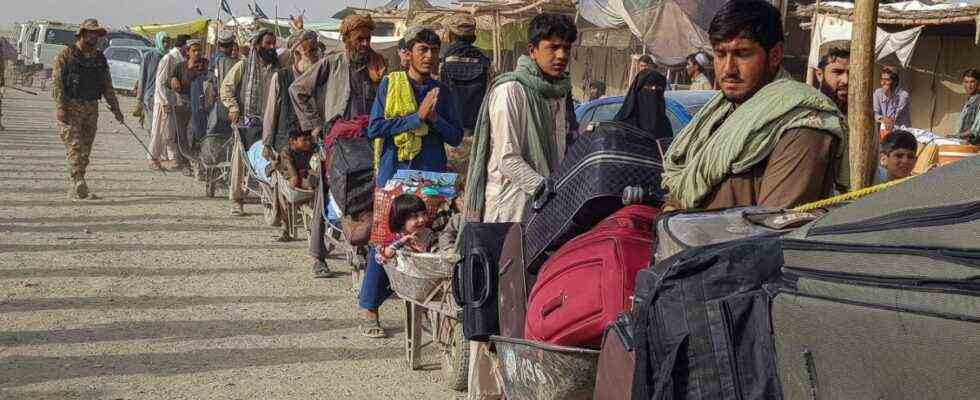Osama bin Laden was shot dead in Pakistan. He was the best-known terrorist who withdrew to Pakistan, but by no means the only one. When the US secret service located him there in 2011 and Navy Seals stormed his house, the government in Islamabad was allegedly not even informed in advance. Washington did not trust the Pakistanis. For years, the US and India have accused Pakistan of tolerating terrorists on their territory. Wounded Taliban fighters were treated in Pakistani hospitals and those killed were buried there.
The richer Islamists own houses in Pakistan and their children go to school there. To ensure that this has consequences, the hashtag #SanctionPakistan was launched this week. “At the same time, the Islamists are celebrating on social networks around the world as a great victory that the Taliban are back in power in Afghanistan,” says Harsh V. Rant. The professor of international relations at King’s College in London also works for the Indian government think tank “Observer Research Foundation”.
Rant quotes Pakistan’s Prime Minister Imran Khan who said immediately after the Americans left that the Afghans had now freed themselves from slavery. “But in fact, this is likely to be a victory for the powerful Pakistani military who supported the Taliban for years,” Rant explains via video call in Delhi. In Pakistan, terrorists are “manufactured and exported on an assembly line, much like cars in Germany” – this is how Indian Foreign Minister Subrahmanyam Jaishankar had explained to German journalists. Rant says now: “A lot of what Pakistan does have to be seen in the context of India.” Pakistan felt strategically at a disadvantage because it saw itself wedged between arch rivals India and the Americans stationed in Afghanistan.
The Pakistanis were irritated by the fact that the Afghan government was seeking proximity to India
On the other hand, the border between Pakistan and Afghanistan is controversial. A stable Afghan leadership could therefore lay claim to areas of Pakistan. Recently, there has been irritation in Islamabad because the Afghan government, under the now-fled President Ashraf Ghani, was seeking proximity to India’s government. Harsh V. Rant says, “Maybe that’s one reason the Pakistani military is cheering now. But it will have ramifications for years. Islamists around the world should feel motivated. It is a mistake to think that an ideological war is going on.” limit yourself to territories. ” The Pakistani Taliban have been carrying out serious attacks in Pakistan for years, including on a school in 2014, killing at least 145 people, most of them children.
The connections of the Pakistani secret service to Afghanistan go back to the time before the US operation, when the Islamists defended themselves against the Soviet occupiers – with the support of the US secret services, which supplied the mujahideen with weapons and know-how. It is not the first time that the US has looked into the barrel of its own rifle in Afghanistan after a regime change. While the US and India are seen as enemies, Pakistan is currently seeking proximity to China. This is probably one of the reasons why Beijing’s foreign minister recently received a Taliban leader for talks.
On his inaugural visit to India in July, US Secretary of State Antony Blinken urged Pakistan “to do whatever it can to prevent the Taliban from taking the country back by force”. But it was unlikely that Islamabad would openly oppose the Islamists in the neighboring country or even act indirectly against them. “Washington is increasing the pressure on Pakistan,” wrote the New York Times well earlier this week.
Prime Minister Imran Khan should speak out clearly against the Taliban. But he has avoided that so far and will probably not do it in the future either. Islamabad had publicly joined Washington’s line and supported negotiations between the US, the Taliban and Afghan negotiators in the incumbent government. the New York Times Imran Khan said in June that Islamabad “is exerting the maximum possible pressure on the Taliban”.
But the greater power factor in Pakistan is the military, and “it has won a great victory here,” is Harsh V. Rant’s assessment. The Pakistani military also does not allow US forces to air strikes from Pakistan on the Taliban in Afghanistan. The news channel Al Jazeera reported Monday that the Pakistani Foreign Ministry had offered to help people who want to leave Afghanistan. Zahid Hafeez Chaudhri, a spokesman for the ministry, said Al Jazeerathat “Pakistan will continue to support efforts to resolve the situation politically” – an announcement that sounds cynical in the light of events.
However, Pakistan has not only accepted the Taliban before, but also people who fled the Islamists. Around 1.4 million Afghan refugees already live in the neighboring country, most of them under poor conditions. Most recently, around 30,000 refugees left Afghanistan for Pakistan every week, which is one of the reasons why Islamabad must better secure the 2600-kilometer border in the future. However, Taliban fighters captured Torkham on Friday, one of the two major border crossings between the two countries. On both sides of the border, those who are not Islamists find themselves in enemy territory.

